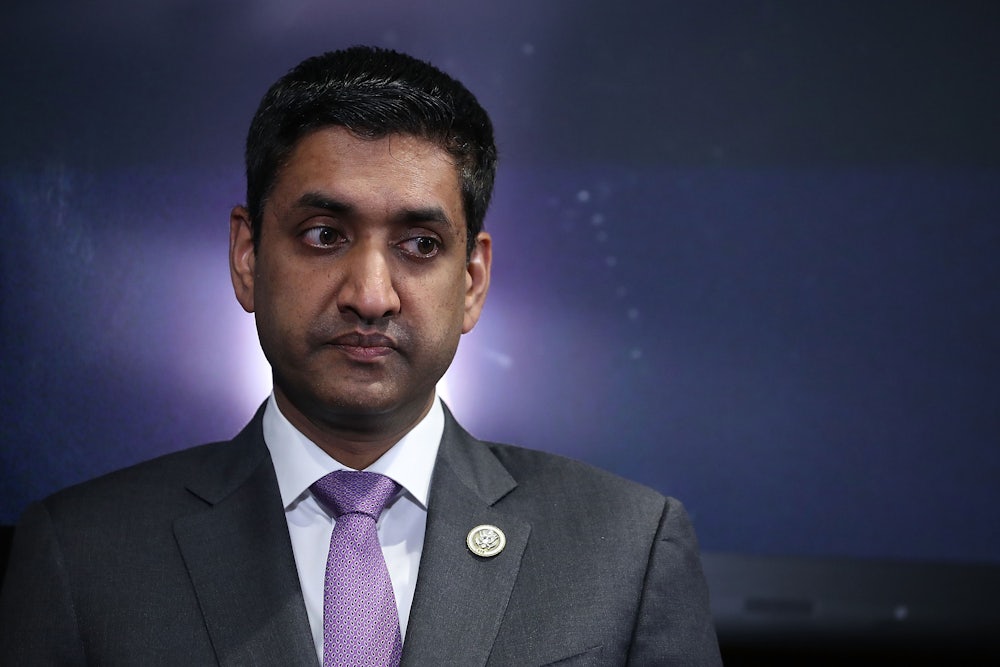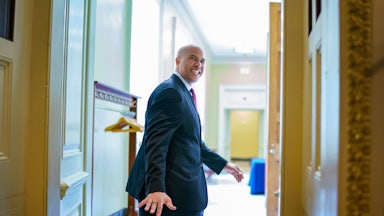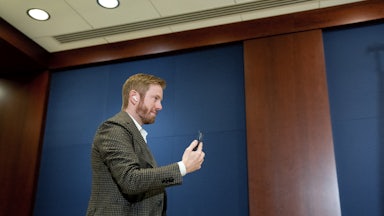It’s time for Democrats to accept that they will need to embrace a less ambitious version of the Build Back Better Act—President Joe Biden’s currently defunct bill investing in health care, childcare, climate change, and education. So says Representative Ro Khanna, who has watched the bill that he and his fellow House Democrats passed last November get mired in Senate negotiations.
One negotiator in particular stands out: Senator Joe Manchin. “I believe we should give him the deference and respect now to put something together that could be a consensus,” Khanna said of the West Virginia senator in an interview with The New Republic last week.
Khanna believes that the Build Back Better Act still has a future. But that’s far from the only piece of consequential business that’s on his mind. A bill aimed at boosting U.S. competition with China is currently winding through the House, and House Speaker Nancy Pelosi has made passing the bill a priority. Khanna believes that the measure will end up looking very similar to his Endless Frontier Act, a version of which passed through the Senate last year.
Khanna also has a new book, Dignity in a Digital Age: Making Tech Work for All of Us, coming out in February. In it, Khanna addresses inequalities in technology access and argues in favor of democratizing the digital economy. “You shouldn’t have to leave Youngstown, Ohio, or Paintsville, Kentucky, or Columbia, South Carolina, to have economic opportunity,” Khanna told me.
We also talked about how Khanna would regulate Big Tech, an idea that’s gaining traction in many quarters of Congress. Khanna represents Silicon Valley, but he’s also a member of the Congressional Antitrust Caucus, which will have a lot to say about any future regulatory or anti-monopoly action directed at America’s titanic tech firms. Last year, Khanna opposed some antitrust bills that were considered in the House, arguing that they were imprecisely drafted.
Our conversation has been lightly edited and condensed for clarity.
Joe Biden and Nancy Pelosi indicated that Democrats may have to settle for a smaller version of Build Back Better. So what do you think of this strategy of trying to get as much as possible while knowing that it may be scaled back?
There’s no other option. If you care about climate and the threat to our planet of inaction, then we have to get climate action passed. I would center a new package on getting as much of the robust $500 billion for climate investment, and then getting a few of the provisions that are noncontroversial, such as universal pre-K, such as shoring up health insurance benefits, having prescription drug costs be negotiated by Medicare. I have had a number of encouraging conversations with Senator Manchin. I believe we should give him the deference and respect now to put something together that could be a consensus. That’s our best chance of having something get to the president’s desk.
You mentioned the noncontroversial items that you think can make it in. What are the things, or some of the things, that you think might be left on the cutting board?
The most popular provision in the entire Build Back Better is Senator Bernie Sanders’s version: to provide hearing aids, dental, and vision for seniors. I don’t understand how that is not going to make it, possibly, in the final version. We should have led with that. I see my mom, who I’ve been trying to convince to get a hearing aid but continues to resist me. It costs thousands of dollars. It ought to be something universally accessible. Today, I’m going to the dentist to get a cleaning. It’s appalling to me that there are many people in this country who don’t have that basic choice, because dental is uncovered.
So that polls off the charts. And I want it, but if I’m being candid, it hasn’t been in and it’s going to be tough. Paid family leave, I want that in. Every other industrialized country has that. How can you not have it in the time of Covid? In my state, California, they’re doing something appalling. They’re having nurses who are still Covid-positive go back to work. I oppose that. But I mean, how can you not have paid family leave? That’s something that is at risk. The child tax credit is at risk. I went on the House floor, and I said, “This is sort of a final vindication for a theory of justice, John Rawls’s theory of distributive justice, that we’re finally going to give every kid 300 bucks,” and how proud I was of that. The reality is that we may have only done that for a year. It’s really painful that these are the things that may not make it in, since you asked for candor.
Do you think that there’s a possibility that you could try to get as much as you can done through Build Back Better, then maybe try to tackle some of these other issues in separate, stand-alone bills?
Yes, I think we should. The challenge is, of course, that you need 60 senators, and that’s a high bar. Fifteen dollars minimum wage—I know people have forgotten about that, because that was a fight in the American Rescue Plan. But I don’t understand why we can’t get that, or at least get some compromise, where we can get 60 senators on board with some increase to the minimum wage.
But the challenge of the stand-alone votes is that they may be like the stand-alone votes on voting rights. I mean, it’s good. We’ll put people on record, show that the Republicans are opposed to a lot of these policies. But it’s not going to actually deliver the change that people want. It may make it an election issue, and that’s fine. We can litigate these things in 2022. But I think we do have to pass something.
To me, the most urgent part is we have to pass climate. I guess some people are gonna criticize me and say, “Bro, you’re saying let Senator Manchin take the first cut in drafting something and be respectful of his concerns.” And I say, “Here’s our choices. You can either have nothing on climate, and we could be remembered in history as a Congress that held the presidency, the House, and the Senate, but did nothing on climate. Or we could be practical and say, ‘We have to get something done on climate.’ And our best shot is to try now with Senator Manchin to do an initial proposal and try to build consensus from there.”
Pivoting to the China competitiveness bill: You’ve led the way on that. And Pelosi is saying that the House will soon introduce its version of that bill.
I had a very encouraging conversation with her yesterday. She’s fully on board; she wants to move this. It’s a bit of a Rubik’s Cube, as so much of Congress is. We have to make sure that labor and enough House Democrats are on board and do that without losing the Republicans in the Senate, because it needs 60 in the Senate. So the speaker’s masterful at figuring those things out. And she’s just trying to do the politics to get this passed. She’s on board intellectually with the vision.
How similar do you think that this new bill will be to your Endless Frontier framework?
I think the key components will be there. The fact is that we’re going to have massive investment in A.I., quantum computing, synthetic biology, clean technology, semiconductors, and electronics manufacturing. For the first time since the Cold War, America is saying we have to win the technology race to win the twenty-first century. The idea that we’re gonna have tech centers in different parts of America, that it’s not all going to be concentrated in the coasts, I think is at the heart of the bill. And of course, you have my district announcing today at the White House that they’re going to be opening this semiconductor plant in Ohio. That’s Exhibit A of what the CHIPS Act may enable to take place on a greater scale. So I think that the outline of the Endless Frontier is still there. The tech directorate would be created, which would mean that we don’t just have theoretical research, we have applied research.
Why do you think that it’s taken so long to get to this point?
I think a couple of things. One, there was an urgent priority on voting rights and an urgent priority on the president’s Build Back Better, as there should have been. This was always the stepchild legislation to those two priorities. There’s only so much bandwidth people have to get things through. Second, this is hard, complicated legislation. You’re having the biggest increase in science and technology since the Cold War, and you’re adding a new directorate to the National Science Foundation. It’s not going to be an easy lift. It shouldn’t be an easy lift. We are making changes that haven’t happened in decades in what we’re doing in science and technology.
The third reason is that there are some differences on trade with what labor is comfortable with and what some of the Senate wanted that has to be reconciled. There is appropriate concern that we do not have provisions in the bill that would escalate the tensions with China into another Cold War. I’m for having strong protections to make sure U.S. dollars, public dollars, are used to develop technology that goes to China. But I’m not for restricting and limiting American universities from collaborating with universities in China when it comes to climate change, advancements in medicine, or advancements in human knowledge.
This bill really has brought together a coalition of very diverse lawmakers, ideologically speaking. You have progressives like you, moderate Democrats, and Republicans supporting it. Why do you think that is?
People understand that the pathway to modern prosperity is in part through technology. I mean, my district and the surrounding areas have $11 trillion of market cap wealth. It’s probably the most wealth generated in any particular region in the history of the world. This is not something that just people in Silicon Valley observe. People around the country observe that, and there’s a sense of, “Well, why is it just happening in Silicon Valley, Miami, New York, and Austin? How do we bring back the parts of the country that face deindustrialization and bad trade deals?” So I think that type of awareness is broadly based. It’s based not just on the exclusion of midsize cities or rural communities but the exclusion of Black and brown communities. One of the points that John Lewis made—one of the great honors of my time in Congress is that I got to write an op-ed with him—but at the end of this op-ed, we say that technology rights are the new civil rights. Lewis believed that you needed to have opportunities for Black and brown young people to participate in this economy. That has been part of the broader coalition.
If you want to lead the twenty-first century, people realize that it’s not going to be by conventional nuclear advantage or conventional aircraft carriers. It’s going to be who leads in A.I. It’s going to be who leads in quantum computing, who leads in some of the technology related to space and satellites, who leads in some of the technology related to the use of submarines. And all of that technology requires public-private investment. So I think you have a coalition of Republicans understanding that basic fact.
This is actually a really good segue to my question on your new book, which is called Dignity in a Digital Age. And I think you’ve kind of just been outlining what that means. But at the risk of asking you to give away the premise of your book, can you talk a little bit more about what that means to you?
Part of it, at the first level, is just making sure everyone has an opportunity for prosperity in a modern economy. You shouldn’t have to leave Youngstown, Ohio, or Paintsville, Kentucky, or Columbia, South Carolina, to have economic opportunity. There are going to be 25 billion digital jobs in this country. Many of them don’t require a college degree. Many don’t require advanced coding. They probably require a 12- to 18-month course, and they pay twice the median average. And these jobs should be accessible to communities across the country. Capital should be accessible for communities to engage in businesses that support digitization.
And the argument at perhaps a slightly deeper level is, if you have that, you may have the opportunity for renewal without cultural displacement. You can tell people that they can live with their friends and their family. They can still have a lot of their traditions, and they can still have a lot of the things that give comfort and give them a sense of place in an America that is changing, but still have economic opportunity. And the book makes the argument that this may actually be a blend of liberalism and community, that you could be rooted in your community, but you also then have exposure to both economic opportunity around the nation and world and to different perspectives around the nation and world. Which is unique, because usually there’s been, in history, such a tension between communities, and then not having an exposure to pluralism.
Finally, the part of the book that is perhaps the most ambitious is that sense of joint worth: allowing us to create some sense of common identity to common prosperity. Could we find that balance, where you can stay in your community, you have some of your own culture, your own traditions, you’re not threatened by a change, and yet you’re working with other communities, on top of prosperity that allow us to transcend the divisions? And it ends with Frederick Douglass’s “Composite Nation,” which I think, next to the Gettysburg Address, is one of the greatest speeches in American history. He writes in “Composite Nation” that we can have all of these different cultures and ways of life, but in the free air of America, what can still emerge is a common American identity. The book struggles to say, how can we still have some common identity while allowing people to retain the distinctiveness of their localities? So that when Kevin McCarthy gets up in every speech on the House floor and says, “Your way of life is threatened,” that people don’t feel that way.
You represent Silicon Valley, but you’re also a member of the antitrust caucus. You’ve talked about needing to break up Facebook, which seems counterintuitive, perhaps. How do you believe that Congress should move forward in passing antitrust legislation and regulating big tech?
I have a whole chapter, Chapter 6 in the book, about antitrust in tech and what I think the right framework is. But let me offer some high-level thoughts. First of all, I think the concentration is not just in tech. You have to look at the concentration when it comes to shipping carriers, and that’s one of the big challenges people are facing right now, that shipping costs are contributing or exacerbating inflation. I think that it’s obviously true that inflation isn’t just being caused because of concentration. It’s been caused because you have too much money chasing too few goods. But when you have scarcity, a monopolist is more able to charge a monopoly price, and then the price is higher. So the abilities of monopolists to profit in times of scarcity are higher, and we have to look at this across the board.
It would be a mistake to exclude tech from that scrutiny. Silicon Valley is more than just the leading companies. They’re also the entrepreneurs. They’re all the venture capitalists. They’re the people who want to become the next Google or Facebook. So what we want to make sure of is that the next generation of entrepreneurs have had that chance to innovate. That next generation of entrepreneurs should have that chance in places other than Silicon Valley. If you just had Silicon Valley in such a dominance, then it would be hard for my thesis, saying, “Let’s have innovation and prosperity in different parts of the country,” to take off.
It has to be done in thoughtful ways. You shouldn’t just break up companies. Some of the bills, if they’re not carefully crafted, could have the semiconductor market broken up into hundreds of different markets. That would be totally irrational. I mean, we want semiconductor companies in my view, like Intel, to be integrated, so they can make semiconductors competitively with TSMC, Taiwan’s semiconductor manufacturing company, or Samsung. But you don’t want companies acquiring rival competitors, as Facebook most egregiously did with Instagram and WhatsApp. So I think we have to have more scrutiny on large mergers, especially those over a billion dollars that are inherently going to try to undermine competition.
Secondly, I would say we need to make sure that these these platforms aren’t discriminating against sellers in ways that are unfair. If you’re a company like Amazon, or any other tech companies, you shouldn’t just be able to say, “OK, I don’t like Ro Khanna. Ro writes about the Stop Bezos Act in his book, and criticizes Jeff Bezos. And so I’m going to make sure Ro’s book never shows up in the algorithms as high up on the scale.” That’s a pretty egregious example, and they’re not doing that. But there are examples of Amazon making judgments and helping certain small businesses versus others, based on their own business models, or helping their own products versus others. And those are things that I think are antitrust violations.
You opposed some of the antitrust bills that were considered in the House last year. Could you explain your opposition to that and how you think these bills got things wrong?
I was opposed to some of them as drafted. So I support a lot of Klobuchar’s thinking on this, where you have high scrutiny of mergers that are over a billion dollars, or something. [Editor’s note: Senator Amy Klobuchar’s Competition and Antitrust Law Enforcement Reform Act would require companies to prove they will not create a monopoly for megamergers of over $5 billion.] But in some of the bills there were $100 million mergers. That, I think, hurts the ability of startups to emerge and get acquired. And it’s not that they’re actually a rival market.
Some of the bills, I think, were drafted in ways that weren’t precise. So if you don’t provide an exception for a company to be able to enforce the terms of its own service, then it may lead to a situation where Apple couldn’t kick off Parler. And, obviously, we don’t want that. We want, in my view, content moderation and a sense that Apple could kick off Parler if it thought it violated its service. But we don’t want Apple to discriminatorily or arbitrarily kick off sellers. So I said, “Let’s have a little bit of greater nuance in the drafting.” I had told people in the House and the people who drafted it that these are not in their final form. They need a lot of work, and they need a lot of work to be consistent with basic Supreme Court jurisprudence over the last case. People need to draft those bills in ways that just are consistent with the jurisprudence. So it was sort of—we still need to work on this.










